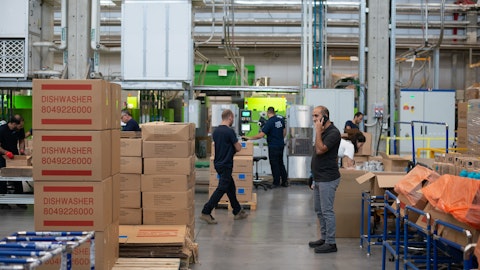Bascome Majors: So higher fuel is helpful next year, and you know it’s — profit improvement is not purely a function of the bid season for you. It really can involve utilization as well. Is that fair?
Alain Bedard: It’s fair, yeah. Absolutely. So utilization is too low. Okay. So that’s number one. And number two, rates are about, okay, not so bad because, you know, we hold on to the rate, okay, and we less — we get less volume because we hold on to our rate. But then we’ll also get squeeze on fuel surcharge. So instead of getting the fair fuel surcharge because the market is soft, we get a discounted fuel surcharge from the ships today, right. So before things start to get better for us, we need more volume so that the market condition starts to change with the shipper. Okay. And it’s kind of a cycle thing, right. So some people are dropping from the market right now because you know, they come to the shippers with fuel in price, and then oops they lose their fuel card because they can’t pay their fuel bill.
So I mean the demand is still weak and the offer is still more than the demand, but you’re going to see some truckers slowly getting out of the business, okay, because, you know, they get with the shippers with stupid pricing. So that’s why I’m saying we’re on the floor, okay. Are we going to stay on the floor for three months? Absolutely. Is that going to last for nine months? I don’t know. But one thing is for sure, I don’t think that we’re going to see worse condition than what we have today. And then also listening to what the way our peers are looking at the market, you know, and I think it’s basically the same message is that we’re on the floor. It’s just that how fast can we get up from the floor? It’s hard to say.
Bascome Majors: Okay. Thank you.
Operator: The next question comes from Elliot Alper of TD Cowen. Please go ahead.
Elliot Alper: Great. Thank you. This is Elliot on for Jason Seidl. Maybe over on the logistics side and the JHT acquisition. I guess how’s the integration going so far? How does their margin profile maybe compare to your core logistics margin? Maybe how we should think about that in Q4? I know they’re a pretty niche player in the auto space. Curious if they’re being affected by the auto strikes as well.
Alain Bedard: Yeah, very good question. So, no, they’re not affected by the auto strikes at all. Okay, number one. Number two is their profile of margin is similar to ours, right. So they’re not in the business of 2%, 3%, bottom line because we’re not big fan of that. You know, we’re not big fan of 2%, 3%. So they’re close to ours. And then you know I think that JHT will do better than the average TFI Logistics earnings in ’24, ’25. We see probably in ’24 a little bit of a dip in volume, okay, at JHT versus ’23, but we see a major improvement for ’24, according to the forecast that I’ve seen so far. In terms of the integration, I mean, this is so new to us. I mean, we’re just learning, okay, with the team there. I mean, JHT is a fantastic company.
It’s a great acquisition for TFI Group of Companies. As a matter of fact, after this call, I’m going to be with the management team of JHT to talk about their plan for ’24. And you know I think that even with less volume I think that JHT will do as well in ’24 as they did in ’23. So very happy with this transaction and this is the kind of deal that’s going to help us create value for our shareholders long-term.
Elliot Alper: Got it. And then maybe separately on logistics. You know, as a whole, I mean, you had some organic operating income growth, I believe, in the quarter. I think you called out some strength in the same-day package business. Any other color there on this would be helpful. Thanks.
Alain Bedard: Yeah. You know what, our logistics arm, our last mile operation in US is doing really well. I mean, our volume is about stable year-over-year in a more difficult market. We’re down a bit in Canada because one of our customer, we just cut him off because of issues with credit. So this is why in Canada, our volumes are down a bit, okay, year-over-year in Q3. But we have a new business coming on stream for Q4. So probably Q4, we’re going to be flat year-over-year in terms of volume, again in a softer market, okay, in ’20 versus ’22. So we’re doing well on the medical side of things. The e-commerce for sure, I mean e-commerce is not as good today as it was two years ago. So it’s a little bit of a fight. But we have a fantastic team over there that’s doing a great job.
So volume is about stable, but profit is up. If you look at year-over-year, I mean, JHT is helping, US logistics is also helping. Our volume is down at WW quite considerable, okay, because of market condition, but the bottom line is down just a few points. So all-in-all our logistic is performing really well and I think that we’re going to do even better in ’24.
Elliot Alper: Great. Appreciate it.
Alain Bedard: Welcome.
Operator: The next question comes from Cameron Doerksen of National Bank Financial. Please go ahead.
Cameron Doerksen: Yeah, thanks. Good morning.
Alain Bedard: Good morning, Cameron.
Cameron Doerksen: So maybe just a quick couple of questions on the packaging courier business. Just wondering if you can talk a little bit about the outlook as we head into kind of the peak volume period for that business. I mean, what does it look like this year year-over-year? And then maybe secondly, just on the margin, some pressure year-over-year. I mean, how much of that is I guess maybe a little bit lower volume environment but how much is also perhaps the benefit from or the lack of benefit from fuel surcharge revenue?
Alain Bedard: Right. Right. Absolutely, Cameron. I mean our volume is down 7%, right. So if you look at our piece count and all that, if I remember correctly, I mean, we’re down about 7%. On revenue, we’re down $8 million. And basically, we’re down $8 million on OE, Q3 year-over-year. And some of that is it’s attributable to less volume, okay. Our cost is about stable, okay, but the volume is just killing us. And because we’re so dense, because we’re so good, okay, when fuel is expensive, we make a little bit of money on fuel. When fuel is not expensive like it is now, that profit is gone, right. So that is a little bit of a headwind for our Canadian LTL in our package. When fuel is low, I mean, we don’t make — we don’t have a little bit of profit from fuel.
When fuel is high, we do well on fuel because of our density which is very different than our US LTL operation because we never make money on fuel in the US LTL world like today. Now that’s going to also help us because our MPG because of the new equipment is doing way better. Okay. There’s about 17%, 18% saving on our new trucks versus the old trucks that we used to run. So over time, I mean, when fuel was going to go back a little bit higher, that should help us in the US as well. But that’s the story. The way we see Q4, Cameron, into the volume for our P&C, volume will not improve year-over-year. The market is too soft. And us, we’re focused on bottom line like we’ve said many times. So I mean this is why, guys, let’s protect the margin and let’s not fight this — fight with customers that don’t want to pay the fair price.
Cameron Doerksen: Okay. That’s helpful. And maybe just a quick follow-up just on I guess how we should think about CapEx for FY 2024. Obviously, you haven’t set your budget yet, but just kind of framework, is there anything, I guess, directionally you can tell us about CapEx as we look into next year?
Alain Bedard: I would say about the same as this year, Cameron. So far what I could think of okay. So you know, for sure, we did a lot of CapEx in TForce Freight. That was well warranted. And we will continue to make sure that the average age of our fleet keeps going down closer to 4 versus 4.7 it is right now. Our trailer fleet is — needs some improvement too. So it’s underway. So I would say overall for TFI, CapEx should be in the same league as what we’ve seen in ’23.
Cameron Doerksen: Okay. That’s great. Appreciate the time. Thanks.
Alain Bedard: Thank you, Cameron.
Operator: The next question comes from Bruce Chan of Stifel. Please go ahead.
Andrew Cox: Hi. Good morning. This is Andrew Cox on for Bruce.
Alain Bedard: Okay. Good morning.



